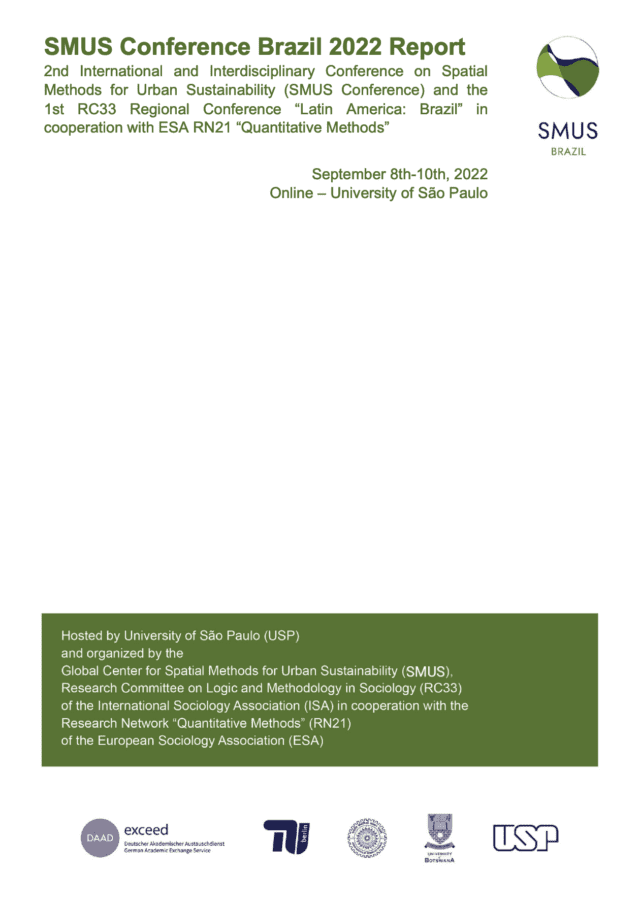Conceptually and logistically the event stemmed from the institutional engagement of the SMUS teams both at USP and at Technische Universität (TU) Berlin alongside the USP departments of Sociology and of Architectural Project, which are based respectively at the USP Faculty of Philosophy, Languages and Human Science and the Faculty of Architecture and Urbanism.The still ongoing global uncertainties brought about by the Covid-19 pandemic have forced SMUS to keep on the online format employed at the SMUS Conference Botswana, which convened more than one year ago at the University of Botswana in Gaborone. Aware of the challenges to academicsociability implicit in this choice after three pandemic years, the SMUS Brazil Team did their best to circumvent the essentially inhospitable nature of online academic conferences. The six keynotes, twenty sessions, two roundtables and twelve Advanced Method courses comprised by the SMUS Conference Brazil were ‘musically’ entangled with one another. Various talented young musicians from USP offered us seven self-composed (video) soundtracks of instrumental music to enrich in artistic terms the Conference breaks and the breaks prior respectively to the Opening Ceremony, Opening Lecture and to the Closing Lecture.Inspired by this musical setting, the SMUS Conference Brazil intended to further the global dialogue on methods by scholars and researchers from all over the world and all social and spatial sciences (e. g. anthropology, area studies, architecture, communication studies, computational sciences, digital humanities, educational sciences, geography, historical sciences, humanities, landscape planning,philosophy, psychology, sociology, urban design, urban planning, traffic planning and environmental planning) by focusing especially on the following ten issues, which were addressed in the framework of twenty sessions:
- spatial and temporal research (three sessions: ‘Ethnography as Spatial-Temporal Method’, ‘Historical Methods in Grappling with the Global South Challenges in the 21st Century’, ‘Political Ecology of the ‘Urban’: Historical and Situated Perspectives’)
- decolonizing (social-scientific) knowledge(three sessions: ‘Decolonizing Social Science Methodology’, ‘Co-Production (of Knowledge) as Pathway to Decolonization of Knowledge in the Global South’, ‘From Living Labs to Sites of Unity: Decolonizing Urban Experiments with Planetary Futures’)
- mapping (session ‘Hybrid Mapping and Critical Cartography as Research Methodologies for Cities’)
- informatics (session ‘Sense-making with (Unconventional) Large Digital Datasets in Social and Cultural Research –Methodological Challenges and Approaches’)
- spatial/cognitive crossroads (four sessions: ‘Migration, Mobilities, and Displacement in the “Global South”’,‘Mobile Methods and Sociospatial Inequalities’, ‘Spatial Methods in Transdisciplinarity and Interdisciplinarity for Urban Sustainability’, ‘Collaborative Research and Mutual Learning in Urban Sustainability Projects’)
- intersections in urban planning (two sessions: ‘Studying Urban Planning and Governance Through Qualitative Approaches: Perspectives from Various Spatial Contexts’, ‘Urban Planning and Design Contribution to Understanding the Socio-Spatial Dynamic of Place and Memory’)
- housing (three sessions: ‘Methodological Weaknesses in Approaching Affordable Housing in the Global South –Need for Context-Responsive Approaches’, ‘Dialogues on Social Housing’, ‘Applying Spatial Methods in Homelessness Studies: Methodological and Ethical Challenges’)
- violence (session ‘Spatial Dynamics of Violence: Qualitative Methodologies and Discussions)
- healthcare (session ‘Spatial Methods in Healthcare Research’)
- food (session ‘Methods in Food Studies Research’)







